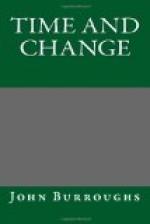A German anatomist says that we have the vestiges of one hundred and eighty organs which have stuck to us from our animal ancestors,—now useless, or often worse than useless, like the vermiform appendix. Eleven of these superannuated and obsolete organs we bring from the fishes, four from amphibians and reptiles. The external ear is a vestige—of no use any more. Our dread of snakes we no doubt inherited from our simian ancestors.
How life refined and humanized as time went on, sobered down and became more meditative, keeping step, no doubt, with the amelioration of the soil out of which all life finally comes. Life’s bank account in the soil was constantly increasing; more and more of the inorganic was wrought up into the organic; the value of every clod underfoot was raised. The riot of gigantic forms ceased, and they became ashes. The giant and uncouth vegetation ceased, and left ashes or coal. The beech, the maple, the oak, the olive, the palm came in. The giant sea serpents disappeared; the horse, the ox, the swine, the dog, the quail, the dove came in. The placental mammals developed. The horse grew in size and beauty. When we first come upon his trail, he is a four-hoof-toed animal no larger than a fox. Later on we find him the size of a sheep with one of his toes gone; still later—many hundred thousand years, no doubt—we find him the size of a donkey, with still fewer toes, and so on till we reach the superb creature we know.
The creative energy seems to have worked in geologic time and in the geologic field just as it works here and now, in yonder vineyard or in yonder marsh,—blindly, experimentally, but persistently and successfully. The winged seeds find their proper soil, because they search in every direction; the climbing vines find their support, because in the same blind way they feel in all directions. Plants and animals and races of men grope their way to new fields, to new powers, to new inventions.
Indeed, how like an inventor Nature has worked, constantly improving her models, adding to and changing as experience would seem to dictate! She has developed her higher and more complex forms as man has developed his printing-press, or steam-engine, from rude, simple beginnings. From the two-chambered heart of the fish she made the treble-chambered heart of the frog, and then the four-chambered heart of the mammal. The first mammary gland had no nipples; the milk oozed out and was licked off by the young. The nipple was a great improvement, as was the power of suckling in the young.
Experimenting and experimenting endlessly, taking a forward step only when compelled by necessity,—this is the way of Nature,—experimenting with eyes, with ears, with teeth, with limbs, with feet, with toes, with wings, with bladders and lungs, with scales and armors, hitting upon the backbone only after long trials with other forms, hitting upon the movable eye only after long ages of other eyes, hitting on




